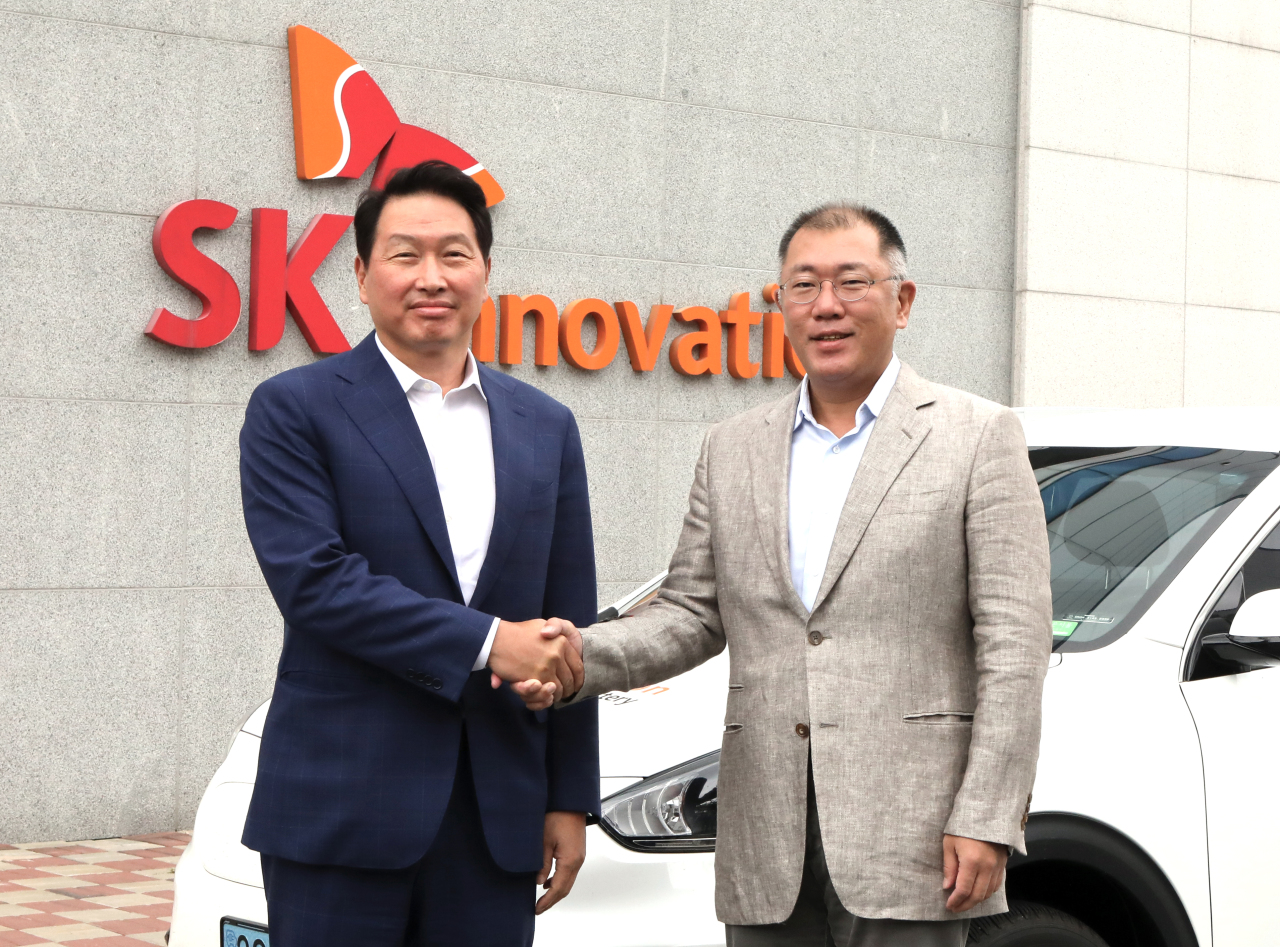Hyundai, SK chiefs discuss next-gen lithium-metal EV battery
By Kim Byung-wookPublished : July 7, 2020 - 17:05

Hyundai Motor Group Executive Vice Chairman Chung Euisun on Tuesday met SK Group Chairman Chey Tae-won at SK Innovation’s electric vehicle battery plant in Seosan, South Chungcheong Province, to discuss future partnerships and next-generation EV technologies including lithium-metal batteries.
Current lithium-ion batteries consist of four key components: cathode, anode, electrolyte and separator. Lithium-metal batteries use metal instead of graphite for anodes, increasing energy density by more than 10 times, which translates to greater range for EVs.
The meeting came at a time when Hyundai Motor is searching for next-generation batteries not only for its EVs but also for its unmanned aerial vehicles and personal aerial vehicles currently under development.
“It was meaningful to exchange ideas on future EV batteries and the direction of new technology development. Hyundai Motor will expand collaborations with companies with world-class technology,” Chung said.
The meeting was attended by executives from both groups. Hyundai Motor Group’s R&D President Albert Biermann, President of Planning and Coordination Office Kim Karl, President Seo Bo-shin in charge of the product division and Hyundai Mobis President Park Jung-kook were greeted by SK Group Executive Vice Chairman Chey Jae-won, SK Innovation CEO Kim Jun, SK Holdings CEO Jang Dong-hyun and SK Innovation’s battery business chief Ji Dong-sup.
At SK Innovation’s 4.7 gigawatt capacity plant, Hyundai Motor executives took a group tour of a production line that makes batteries for Niro EV. Currently, SK Innovation supplies batteries for Hyundai Motor’s plug-in hybrid vehicles and its sister company Kia Motors’ Niro EVs and Soul EVs.
“As Hyundai Motor and Kia Motors have a leading stature in global EV and future mobility markets, this partnership will give a boost not only to both groups but also the Korean economy,” Chey said.
Chung has been holding meetings with leaders of the country’s top conglomerates involved with EV batteries. He met with LG Group Chairman Koo Kwang-mo at LG Chem’s Ochang plant in North Chungcheong Province last month and Samsung Electronics Vice Chairman Lee Jae-yong at SDI’s Cheonan plant in South Chungcheong Province in May to discuss their technology advances.
The recent meetings with the EV battery makers are seen as Chung’s efforts to ensure a stable supply of EV batteries as the global needs for the batteries are expected to intensify, with demand of 916 gigawatt-hours overtaking the supply of 776 gigawatt-hours in 2023, according to SNE Research.
In 2022, Hyundai aims to begin the mass production of pure EVs based on its new platform called Electric-Global Modular Platform, E-GMP. The new platform will allow the automaker to load batteries under the car’s floor instead of putting them inside engines.
On December last year, SK Innovation was selected as a supplier to deliver the first batch of batteries for Hyundai’s pure EV models. The 10 trillion-won ($8.3 billion) deal will supply batteries to Hyundai’s 500,000 EVs for five years starting late 2021, according to industry sources.
Hyundai Motor and Kia Motors have sold 280,000 EVs at home and abroad since the launch of pure EVs in 2011. According to EV Sales, Hyundai sold 24,116 pure EVs in the first quarter, ranking fourth after Tesla, Renault-Nissan Alliance and Volkswagen Group, which sold 88,400, 39,355, 33,846 pure EVs, respectively.
The South Korean automakers are expected to introduce 44 eco-friendly vehicles by 2025, 23 of them as pure EVs.
Hyundai Motor aims to sell 560,000 EVs and hydrogen fuel cell EVs in 2025 to become one of the world’s top three EV makers while Kia Motors plans to sell 500,000 EVs globally, excluding sales in China.
By Kim Byung-wook (kbw@heraldcorp.com)








![[Kim Seong-kon] Democracy and the future of South Korea](http://res.heraldm.com/phpwas/restmb_idxmake.php?idx=644&simg=/content/image/2024/04/16/20240416050802_0.jpg&u=)







![[KH Explains] Hyundai's full hybrid edge to pay off amid slow transition to pure EVs](http://res.heraldm.com/phpwas/restmb_idxmake.php?idx=652&simg=/content/image/2024/04/18/20240418050645_0.jpg&u=20240418181020)

![[Today’s K-pop] Zico drops snippet of collaboration with Jennie](http://res.heraldm.com/phpwas/restmb_idxmake.php?idx=642&simg=/content/image/2024/04/18/20240418050702_0.jpg&u=)